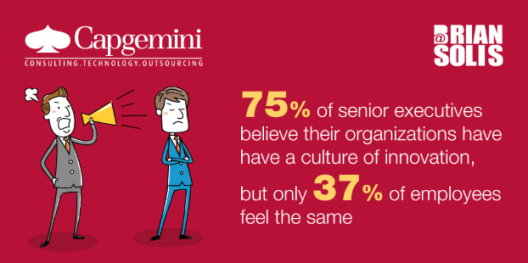Tags
Is there is a disconnect in what members of the C-Suite believe and what employees believe?
Is it a question of who is right?
Not really. Leadership requires listening. Listening can lead to lots of things. One of the things it can lead to is insight about the culture and what it will take to change.
Brian Solis makes a great case that change must be about culture.
Every time I lead a research study to learn how companies are (and aren’t) succeeding in digital transformation and innovation, corporate culture is consistently cited as the leading inhibitor in both cases. Said another way, corporate culture is to blame for the lack of innovation and change. Yet, most of the time, executives will actually say the opposite, that they do in fact have a culture of innovation.
However, in my recent report with CapGemini, “The Digital Culture Challenge,” we found a significant gap, 75% of senior executives believe their organization has a culture of innovation, but only 37% of employees feel the same.

In that same study, we also learned that 62% of respondents considered culture as the number one hurdle to digital transformation – yet just 7% of organizations have created a culture where employees can test, learn and deploy new ideas rapidly.
In an era of digital Darwinism, one where technology and society are evolving at accelerated paces while businesses are not, culture must shift from being the number one inhibitor to become the number one catalyst. These times warrant a new mantra, “adapt or die!”
